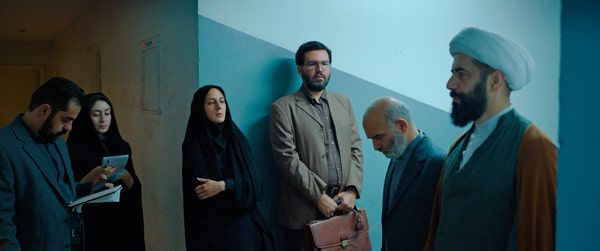Eye For Film >> Movies >> Holy Spider (2022) Film Review
Holy Spider
Reviewed by: Amber Wilkinson

Although Ali Abbasi’s Holy Spider was made before the wave of protests in Iran following the death of Mahsa Amini after she was detained by the country’s morality police, there’s no doubt it has gained extra resonance as a result. It’s also worth noting, however, that one of the film’s tacit assertions - that police are much less interested in tracking down murderers if the victim is a street worker - is something that is not particular to Iran. In Britain, for example, you need only look at the Yorkshire Ripper case, where police only started to really take things seriously after, in their words “innocent young girls” and not just sex workers were murdered.
Abbasi draws on the real-life case of serial killer Saeed Hanaei - previously outlined in Mahiar Bahari’s documentary And Along Came A Spider and fictionalised in Ebrahim Irajzad’s Killer Spider - who targeted street workers in what he saw as a “jihad” against immorality. What starts off as a conventional crime thriller as a journalist Rahimi (Zar Emir-Ebrahimi) travels to the city of Mashhad in a bid to track down the thriller expands into a consideration of societal attitudes and their insidious creep from one generation to the next.

The writer/director doesn’t pull his punches in his depiction of the murders but though that makes this hard to watch he is arguably asking us to really acknowledge the victims here as living, breathing and, indeed, dying humans rather than merely statistics. As the film was shot in Jordan rather than Iran, where it has unsurprisingly been banned, there’s also much more intimate depiction of women than would usually occur in an Iranian film. They are shown without headscarves and taking drugs among other things and each victim is shown to have a life beyond having sex for a living. The look of the film at night is given a seedy sketchiness by cinematographer Nadim Carlsen, garish make-up barely hiding the ravages of the job shown on each of the street worker’s faces.
Those coming to the film, which has been Oscar-shortlisted for International Feature, purely for its crime noir element may be disappointed as its true strengths lie elsewhere. This is less about the puzzle of who the murderer is - the identity of the Spider Killer (Mehdi Bajestani) is revealed almost from the start - than about the way he slots into society and, after his arrest, is viewed by the public. Although there is some tension in the way that Rahimi poses as a street worker in order to get her man, the film is more unsettling in the depiction of Hanaei as a doting husband to his much younger wife Fatima (Forouzan Jamshidnejad), and who is happy to rough and tumble with his kids just hours after squeezing the life out of someone and in its depiction of casual misogyny and official corruption.
Overtly this is highlighted in a scene in which a police officer (Sina Parvaneh) seems all smiles and goodwill before taking on a more predatory aspect, but Abbasi also indicates this misogyny in even the smallest interactions, such as when police trying to examine the latest dumped victim in a field are instructed: “Don’t trample on the tomatoes”.
Beyond the external patriarchy, there is internalised restriction at work, shown in the way Fatima, along with a fair chunk of the populace, cleaves to her husband even in the wake of his crimes. Abbasi indicates the slippery nature of the phrase “justice served” as he ends his film with a chilling epilogue that indicates the spider’s web stretches well beyond Hanaei and shows few signs of weakening.
Reviewed on: 08 Jan 2023















